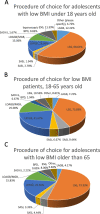Bariatric and metabolic surgery in patients with low body mass index: an online survey of 543 bariatric and metabolic surgeons
- PMID: 37689633
- PMCID: PMC10492360
- DOI: 10.1186/s12893-023-02175-4
Bariatric and metabolic surgery in patients with low body mass index: an online survey of 543 bariatric and metabolic surgeons
Abstract
Background: Metabolic and bariatric surgery (MBS) in patients with low body mass index patients is a topic of debate. This study aimed to address all aspects of controversies in these patients by using a worldwide survey.
Methods: An online 35-item questionnaire survey based on existing controversies surrounding MBS in class 1 obesity was created by 17 bariatric surgeons from 10 different countries. Responses were collected and analysed by authors.
Results: A total of 543 bariatric surgeons from 65 countries participated in this survey. 52.29% of participants agreed with the statement that MBS should be offered to class-1 obese patients without any obesity related comorbidities. Most of the respondents (68.43%) believed that MBS surgery should not be offered to patients under the age of 18 with class I obesity. 81.01% of respondents agreed with the statement that surgical interventions should be considered after failure of non-surgical treatments.
Conclusion: This survey demonstrated worldwide variations in metabolic/bariatric surgery in patients with class 1 obesity. Precise analysis of these results is useful for identifying different aspects for future research and consensus building.
Keywords: Bariatric surgery; Low BMI; Metabolic surgery; Survey.
© 2023. BioMed Central Ltd., part of Springer Nature.
Conflict of interest statement
The authors declare no competing interests.
Figures

References
-
- Gastrointestinal surgery for severe obesity National Institutes of Health Consensus Development Conference Statement. Am J Clin Nutr. 1992;55(2 Suppl):615s–s619. - PubMed
-
- Stegenga H, Haines A, Jones K, Wilding J. Identification, assessment, and management of overweight and obesity: summary of updated NICE guidance. Bmj. 2014;349. - PubMed
-
- Huang Z-P, Guo Y, Liu C-Q, Qi L, Zou D-J, Zhou W-P. The effect of metabolic surgery on nonobese patients (BMI< 30 kg/m2) with type 2 diabetes: a systematic review. Surgery for Obesity and Related Diseases. 2018;14(6):810–820. - PubMed
MeSH terms
LinkOut - more resources
Full Text Sources
Medical

